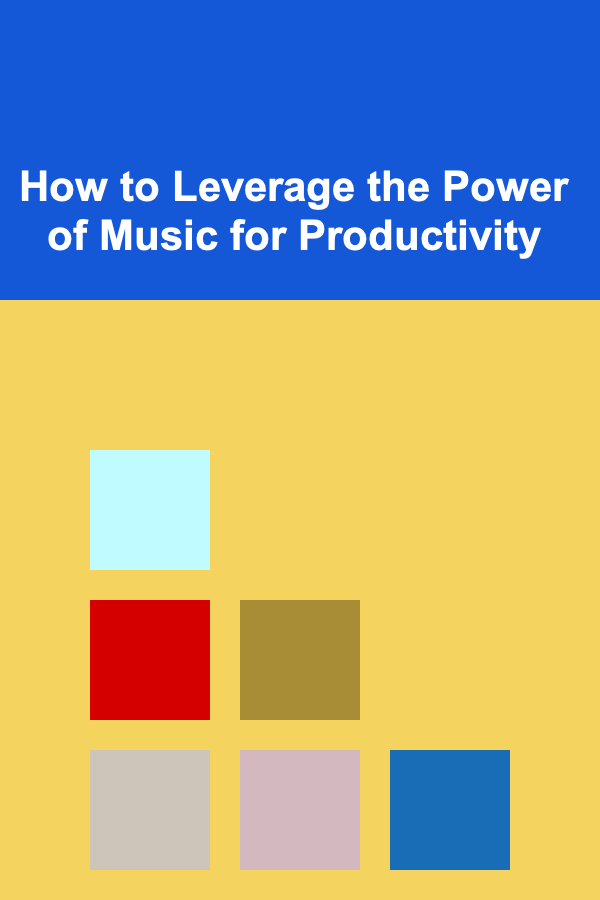
How to Leverage the Power of Music for Productivity
ebook include PDF & Audio bundle (Micro Guide)
$12.99$9.99
Limited Time Offer! Order within the next:

Music has been a part of human culture for centuries, transcending boundaries of time, geography, and language. It has the ability to evoke deep emotions, create atmosphere, and, surprisingly, enhance productivity. Whether you're working on a creative project, studying for an exam, or trying to complete a demanding task, music can be a powerful tool to boost focus, reduce stress, and improve overall efficiency. In this article, we will explore how you can leverage the power of music for productivity, looking at the science behind music's effects on the brain, the types of music that are most effective, and strategies for incorporating music into your daily workflow.
The Science Behind Music and Productivity
Before diving into the practical applications of music in the workplace or study environment, it's important to understand the science behind its effects on productivity. Music has a profound influence on the brain, affecting both emotional and cognitive processes. Let's break down some of the key scientific findings that explain why music can boost productivity.
1. Music and the Brain: A Deep Connection
Research has shown that listening to music activates several areas of the brain, including the prefrontal cortex, which is responsible for tasks such as decision-making, planning, and problem-solving. Music can also stimulate the release of dopamine, a neurotransmitter associated with pleasure and motivation. This explains why music can elevate mood, boost energy, and enhance focus.
When you listen to music, especially songs that you enjoy, it can have a positive impact on cognitive function, including memory retention and problem-solving skills. Some studies suggest that listening to music while working or studying can create a more favorable environment for learning and creativity.
2. The Mozart Effect: A Classic Example
The "Mozart Effect" refers to a popular theory that suggests listening to Mozart's music can temporarily improve one's intelligence or cognitive abilities. While the research around the Mozart Effect has been controversial, studies have shown that classical music, in general, can enhance focus and concentration. Classical music is known for its structured, harmonious qualities, which may help to create a more organized mental state conducive to productive work.
However, it's important to note that the benefits of music on productivity are not limited to classical compositions. Different genres of music can have varying effects on different tasks and individuals, and the key is to find the right type of music that works for you.
3. Music and Stress Reduction
Stress can be a major barrier to productivity. When we are stressed, our bodies produce higher levels of cortisol, a hormone associated with the fight-or-flight response. Elevated cortisol levels can impair cognitive function, reduce focus, and hinder creative thinking. Music, particularly calming and soothing genres like classical, ambient, or nature sounds, can help reduce stress by lowering cortisol levels and promoting relaxation.
Music has also been shown to improve sleep quality, which in turn boosts productivity the next day. A well-rested mind is more capable of processing information, making decisions, and completing tasks efficiently.
Types of Music That Boost Productivity
Now that we have a basic understanding of the science behind music and its effects on productivity, let's explore the types of music that can help you be more productive. Different genres can have different impacts depending on the task at hand, and the key is to choose music that aligns with the activity you're doing.
1. Classical Music
Classical music is often considered the gold standard when it comes to boosting focus and concentration. The intricate melodies and structured compositions are thought to stimulate the brain's cognitive functions and improve memory retention. Classical music, especially instrumental pieces, provides a non-distracting background sound that can enhance focus without competing for attention.
- Best for: Studying, deep work, problem-solving, and reading.
- Recommended artists: Johann Sebastian Bach, Wolfgang Amadeus Mozart, Ludwig van Beethoven.
2. Lo-Fi Beats
Lo-fi (low fidelity) music has gained popularity in recent years, particularly among students and remote workers. This genre typically features smooth beats, soft instrumentals, and a relaxing vibe. Lo-fi beats are not only great for relaxation, but they also provide a calm and steady backdrop for work. Their repetitive, non-intrusive nature helps to create a state of flow, allowing you to stay immersed in your tasks.
- Best for: Focused work, writing, coding, and brainstorming.
- Recommended playlists: "Lo-Fi Hip-Hop" on Spotify or YouTube.
3. Ambient Music
Ambient music, which consists of atmospheric sounds and minimalistic compositions, is perfect for creating a peaceful and productive environment. It's especially beneficial for tasks that require deep concentration and creativity. Ambient music doesn't have lyrics or strong melodies, making it less likely to distract you while you work.
- Best for: Creative work, meditation, reading, and concentration.
- Recommended artists: Brian Eno, Aphex Twin, Moby.
4. Nature Sounds and Binaural Beats
For some people, nature sounds like rain, ocean waves, or forest sounds provide the ultimate productivity boost. Nature sounds can help to reduce stress and anxiety, making them perfect for creating a peaceful work environment. Similarly, binaural beats are a form of soundwave therapy that can promote relaxation, improve focus, and even increase cognitive performance by producing specific frequencies in each ear.
- Best for: Stress reduction, focused work, relaxation, and meditation.
- Recommended playlists: "Nature Sounds" or "Binaural Beats" on music platforms like Spotify and YouTube.
5. Upbeat Music
If you're working on a task that requires energy, motivation, or a positive mood, upbeat music can be a great choice. High-energy music, particularly pop, rock, or electronic genres, can help you feel more energized and motivated. Upbeat tunes with fast tempos can boost adrenaline and help you power through tasks that require physical activity or high levels of motivation.
- Best for: Physical work, exercise, or when you need a boost of energy.
- Recommended artists: Daft Punk, The Beatles, Beyoncé.
Strategies for Incorporating Music into Your Workflow
Music can be a powerful tool for productivity, but it's important to use it strategically. Here are some practical strategies for incorporating music into your workflow to maximize focus and efficiency.
1. Create a Playlist for Focus
One of the best ways to ensure you're using music effectively is to create a playlist specifically for focus. This playlist should feature music that helps you stay immersed in your tasks without being distracting. You can customize your playlist to fit the type of work you're doing, whether it's deep thinking, studying, or physical activity.
- Tip: Keep the playlist short enough so that you don't have to keep skipping songs. Ideally, it should last as long as you plan to work without interruption.
2. Choose the Right Music for the Task
Different tasks require different kinds of focus, and not all music will help you achieve the level of concentration you need. For example, if you're working on creative writing, you may prefer instrumental music that doesn't have lyrics. If you're performing a repetitive or administrative task, an upbeat song with lyrics might help you stay motivated.
- Tip: Experiment with different types of music to see what works best for each specific task. Keep a mental note of the genres or artists that help you achieve the best results.
3. Use Music as a Timer
Another productivity hack is to use music as a timer. You can time your work sessions based on the length of a song or playlist. For instance, you could work for the duration of a specific playlist (e.g., 30 minutes) and take a break when the music ends. This creates a sense of urgency and can help you stay focused on the task at hand.
- Tip: Use the Pomodoro Technique, which involves working for 25 minutes and then taking a short break. You can time each session with music to keep track of time and maintain focus.
4. Use Music to Mask Distractions
In noisy or open environments, music can help mask distracting background noises, making it easier to focus. This is especially useful if you're working in a shared office space, coffee shop, or public area. Instrumental music, in particular, works well for this purpose because it won't compete with the sounds around you.
- Tip: Use noise-canceling headphones to enhance the effect of the music and block out external distractions more effectively.
5. Avoid Music with Lyrics (When Necessary)
While some people can work with music that has lyrics, others find that vocals interfere with their ability to concentrate, particularly when reading or writing. If you find that lyrics distract you, opt for instrumental music or music that features minimal vocal content.
- Tip: Choose instrumental music from genres like classical, lo-fi, or ambient for tasks that require deep concentration or critical thinking.
Conclusion
Music is a powerful tool that can enhance productivity, improve focus, and reduce stress. Whether you're working on a creative project, studying for an exam, or completing an administrative task, music can help create the ideal environment for peak performance. By understanding the science behind music's effects on the brain, choosing the right type of music, and incorporating it strategically into your workflow, you can harness its full potential and boost your productivity to new heights.
Remember, the key is to experiment with different genres and styles of music to find what works best for you and the tasks you're working on. With the right soundtrack, you can stay motivated, energized, and focused---making even the most challenging tasks seem more manageable.

How to Add a Touch of Glamour to Your Home on a Budget
Read More
How to Build a Family Movie Theater Experience at Home
Read More
How to Market Your Online Business and Attract More Buyers
Read More
How to Transition from Casual to Serious Dating
Read More
Yoga for Healthy Aging: A Comprehensive Guide
Read More
How to Distress Leather for a Rustic Look
Read MoreOther Products

How to Add a Touch of Glamour to Your Home on a Budget
Read More
How to Build a Family Movie Theater Experience at Home
Read More
How to Market Your Online Business and Attract More Buyers
Read More
How to Transition from Casual to Serious Dating
Read More
Yoga for Healthy Aging: A Comprehensive Guide
Read More